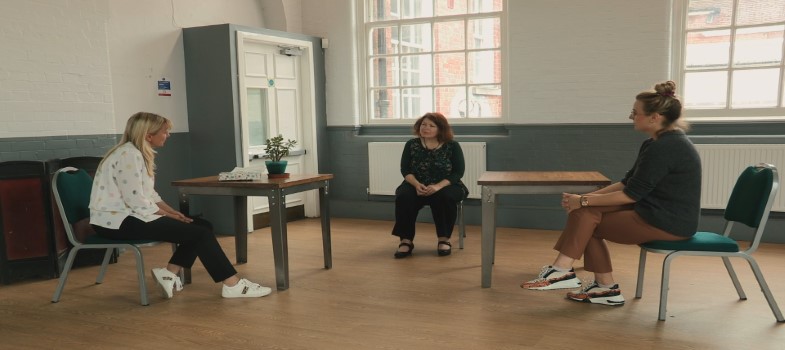SECTION 2 Working with an interpreter (1)
- Setting ground rules, the active stance of the therapist, pre-meeting and debriefing, group/family settings, power dynamics
Pre-Section 2
EXERCISE
Time yourself for five minutes and write a list of preparations you would make before an interpreter-mediated session. Include the ground rules you would mention at the beginning of an interpreter-mediated session.
EXERCISE
Time yourself for five minutes and write a list of preparations you would make before an interpreter-mediated session. Include the ground rules you would mention at the beginning of an interpreter-mediated session.
A teenage boy (Fayek) and his mother (Mrs Abdallah) are going to have a conversation via a remote platform with Frankie. An interpreter (Saif) is present to help with the communication. The boy and his mother are both at home. The boy has been lent a laptop from school and he has decided to conduct the conversation from his room. His mother is in the living room. While you watch the film, think how any of your ground rules or preparations might have avoided the difficulties Frankie encounters?
DISCUSSIONFrankie had received training to work with an interpreter. This included the most important ground rule that “Everything everybody says in the room will be translated out loud.”
However, Frankie discovered that saying this rule was not sufficient. He had to keep active throughout the session and respond accordingly. On the surface, it looks like Frankie remained active throughout, but he realises afterwards that he unconsciously became passive in the interpreter-mediated session.
As the interpreter, Saif, points out, if a family member is present during an interpreter-mediated session, this needs to be handled with great care. Understandably, if the family member speaks both the languages used in the room, they might wish to take on the role of the interpreter.
Why do you think this could cause problems?
The video for this section can be found at https://vimeo.com/469791413
EXTENSION using Other Tongues
Read p.48 to p.51
- How does Kamaljit manage Ana’s offer to act as the interpreter for Maria?
- How does Kamaljit’s management of the situation contribute to Ana’s and Maria’s willingness to accept Kamaljit’s suggestion?
EXERCISE
The situation you just watched in Film 2 is complex. Fayek is one of the clients and that makes the situation even more complicated.
- What do you think made Frankie think he was being active when, on reflection, he realises: I went kind of passive - like I forgot to be a therapist. My empathy just took a break?
- Can you think of three situations and three reasons why a therapist might believe they are being active in an interpreter-mediated session and not notice when they have become passive?
- What can help a therapist to stay active in an interpreter-mediated session?
Read p. 84-85
- What are your strategies for coping in triangular relationships?
- How do they help or hinder you in managing the dynamics in the interpreter-mediated therapeutic session?
We all develop ways of coping with feelings of exclusion. Unless we are aware of our default coping strategies, we will reach for them automatically when we feel excluded in the interpreter-mediated therapy session. Once you are aware of your default strategy you can assess its appropriateness for the context and choose whether or not to employ an alternative strategy.
EXERCISE
Read the attached paper from The Linguist “Good Counsel” p.16-17 on working with an interpreter and write a list of five items you want to cover in the pre-meeting with the clinician/interpreter. Please download the preprint here.
Some people argue that the function of an interpreter in health and social care should be expanded to include the role of an advocate and an intercultural agent. This would increase the agency of the interpreter. Can you make a list of the pros and cons of this suggestion for a mental health/psychological therapy context?
Read the attached paper from The Linguist “Good Counsel” p.16-17 on working with an interpreter and write a list of five items you want to cover in the pre-meeting with the clinician/interpreter. Please download the preprint here.
Some people argue that the function of an interpreter in health and social care should be expanded to include the role of an advocate and an intercultural agent. This would increase the agency of the interpreter. Can you make a list of the pros and cons of this suggestion for a mental health/psychological therapy context?
EXTENSION using Other Tongues
Go to p. 57-59 for a mini-good practice guide for clinicians working with interpreters
Last modified: Thursday, 28 January 2021, 1:17 PM
